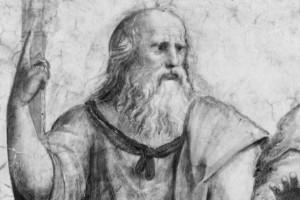385 BC - Plato publishes the Symposium in which Phaedrus, Eryixmachus, Aristophanes and other Greek intellectuals argue that love between males is the highest form.
In philosophical, social and psychological terms, love is deconstructed into ways of loving. In an interview in the documentary entitled “Derrida” 2002 by Kirk Dirby and Amy Zierling Kofman, French philosopher, Jacques Derrida, talks about love in this way.
“Is love the love of someone or of some thing?” “Do I love someone for the absolute singularity of who they are? I love you because you are you. Or do I love you because of your qualities, your beauty, your intelligence? Does one love someone or love something about someone? The difference between the who and the what are at the heart of love that separates the heart.” (“Derrida”)
Derrida differentiates between unconditional love and conditions, by separating the concept of love into the abstract as in “qualities” and love in physical terms of an individual.
Slavic philosopher Slavoj Žižek believes love is unconditional and grounded in realistic belief of an absolute. In “Examined Life”, (Astra Taylor) He talks about our separation to our world in terms of ecology, if we truly love others, and ourselves we need to love our world in the same way. We know that we face insurmountable dangers, yet we are able to continue enjoying the very lifestyle that has created it.
We are separate, disconnected from the fact that we profit from disaster, pointing to oil as a natural resource that comes from the sledge of ‘dead life’. He suggests that we don’t need more connection to our natural world but that we need more alienation so that we may be motivated to work on ideas of survival from a more realistic place. He suggests finding poetry, spirituality from this new age of abstract dimension, accepting our disconnections; for example, loving substances like trash to show true love for the world.
“What is Love? Love is not idealization… If you really love a woman or a man, then you don’t idealize him or her. Love is that you accept a person, for all its [their] failures, stupidities, and none-the-less, the person is absolute for you, everything that makes life worth living. You see perfection in imperfection itself, and that is how we should love the world.” (Žižek, “Examined Life”)
Both Derrida and Žižek point to a separation of matter. Who (the person or world) or what (ideas of love or characteristics) do we love? Žižek believes we need to embrace imperfection, yet with the Internet, choice has enabled the “what” of love to become more predominant. We can choose from literally millions of people to “connect” with, so qualities that we love can be found in many people not just one. We can find what we love theoretically bringing us to the question of “who do we love?”
Why limit it? We are learning to love outside of traditional ideas of partnership and possibly expanding the way we define love in the 21st century to include many in a shared global existence.
"Turn your love around"
George Benson

